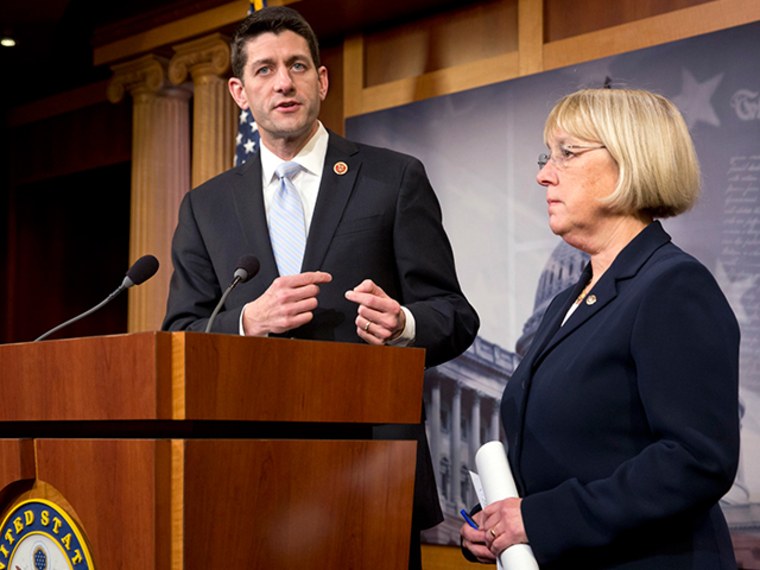Bipartisan congressional negotiators unveiled a long-awaited budget framework to fund the government past mid-January and stabilize the government's finances into the near future.

Rep. Paul Ryan, R-Wisc., and Sen. Patty Murray, D-Wash., the top lawmakers on budgetary issues in their respective chambers announced a fiscal framework that would help eliminate the constant threat of a government shutdown under which lawmakers have worked for the better part of the last three years.
"I think this agreement is a clear improvement on the status quo," Ryan said.
"We have broken through the partisanship and gridlock and reached a bipartisan compromise that will prevent a government shutdown in January," Murray said at a joint press conference to announce the agreement.
The announcement follows a day full of fine-tuning the details of the agreement, which covers the next two fiscal years and set a top-line budget number for each year. The House, where conservatives could upend the agreement if they refuse to vote for it, was slated to act first this week on the legislation.
While both Ryan and Murray were optimistic the framework would have enough support to pass the House and Senate, Washington budget fights have rarely been simple or easy in recent years.
The did win quick praise from House Speaker John Boehner, Ohio, the Republican leader whose dogged budget negotiation strategies had contributed to a government shutdown in October.
"While modest in scale, this agreement represents a positive step forward by replacing one-time spending cuts with permanent reforms to mandatory spending programs that will produce real, lasting savings," Boehner said in a statement.
And President Barack Obama called it "a good first step."
"The agreement doesn't include everything I'd like -- and I know many Republicans feel the same way," the president said. "That's the nature of compromise. But it's a good sign that Democrats and Republicans in Congress were able to come together and break the cycle of short-sighted, crisis-driven decision-making to get this done."
The framework would set spending levels above the $967 billion cap established by the sequester; the budget for 2014 would be set at $1.012 trillion, and the budget for 2015 would be $1.014 trillion. Appropriators will be charged with detailing the particular spending within those limits.
The increased spending was financed in part through $85 billion in reforms and "non-tax revenue," while also providing $63 billion in sequester relief split between military and non-military spending. Ryan said the proposal would reduce the deficit by $23 billion without raising taxes.
Though the tentative agreement falls far short of a "grand bargain" that solves overarching fiscal issues through a combination of new taxes and entitlement reforms, the agreement would offer some stability to government funding after several years of governing characterized by stopgap spending measures.
The deal also leaves some key elements facing Congress unsolved. Continued unemployment benefits, which Democrats want to authorize before the end of the year, are not part of the agreement. One idea under discussion, per a senior Senate Democratic aide, is agreeing to hold a separate vote on unemployment insurance this week.
Ryan and Murray shuttled back and forth between meetings with each other and their respective parties' leadership throughout the day on Wednesday. Each said their leadership was supportive of the agreement, which helped facilitate the successful negotiations.
The proposal could face additional difficulty in the Republican-held House of Representatives, where conservative groups have already begun to work forcefully against the deal before its details were finalized. Conservative groups are wary of new revenues as well as spending above sequester levels.
If conservative Republicans balk at supporting the legislation, it would imperil its passage in the House unless Democrats overwhelmingly support the measure.
"I think conservatives should vote for this," said Ryan, who will make the case for the proposal to House Republicans on Wednesday morning. The former vice presidential candidate said he expected "great support" for the measure from fellow Republicans.
In any case, legislation to formalize the details of the bipartisan agreement would have to move quickly through Congress. The House is scheduled to wrap up its work for the calendar year this Friday, though the Senate is slated to stay in Washington a little while longer.
Congress must vote to fund the government by Jan. 15, the date through which funding was extended as part of the agreement to end October's government shutdown.
Lawmakers face a separate deadline in February to raise the nation's debt limit. Ryan joked that Tuesday's announcement didn't touch on that looming challenge.
"That's another press conference subject matter," he said.